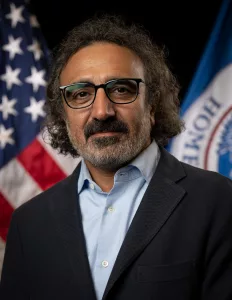Hamdi Ulukaya, the founder and CEO of Chobani

Hamdi Ulukaya. US Department of Homeland Security. Photo: Public Domain.
Yogurt king Hamdi Ulukaya, the founder and CEO of Chobani, has all his values in the right place
Turkish immigrant Hamdi Ulukaya never imagined himself as a business leader. He grew up in a semi-nomadic Kurdish family, splitting his time between the dairy farm and the grazing herd in the Erzincan province.
The family never wanted for quality cheese and yogurt, and Ulukaya now shares his family recipes with the masses as the CEO of Chobani, which has become a market leader in the US and abroad.
“I don’t come from a background of business. I never thought I would be a CEO or starting a company. In my early days. I didn’t even like this field,” Ulukaya told Time. The business mogul, who’s estimated by Forbes to have a net worth of $2.1bn as of April 2023, marches to the beat of a different drum. He challenges businesses that prioritise profit over people to try a page from the anti-CEO playbook, which he outlined in a 2019 TED Talk.
“Living in upstate New York, starting a company, seeing first-hand the power of business, how we can make a dramatic change in people’s lives, even faster and more sustainable than sometimes government and other organisations. When I saw that side of things, I fell in love.
“And then money becomes this tool, a powerful tool. Today we are over $2bn in sales with over 2,000 people. This social side of us — to be mindful of being impactful in our communities and societies — is really what drives us every day. If you take that out for any reason, we wouldn’t be as successful as we are today.”
Ulukaya worked on the family farm with his six siblings before studying political science in Ankara, then moved to the US to take English and business courses in New York. He worked on a farm in upstate New York before launching a feta cheese venture, which, despite its popularity, had barely broken even by the two-year mark. Ulukaya says they were some of the most challenging years of his life — but they helped set the stage for the next chapter of his entrepreneurial journey.
Hamdi Ulukaya chanced upon a sales advert for an old yogurt factory and initially tossed the mailer; within 20 minutes he had dug it out of the trash. Kraft had previously run the plant, but when the food conglomerate sold its yogurt business in 2004 to CoolBrands International for $59m, the idle factory was put up for sell “as-is” for $700,000.
He went to see the property the next day. “It took me four hours to find it. It was in the middle of nowhere and was 70 years old,” Ulukaya told the Washington Post. “At some point, you could tell there was a lot of life in there, and there were about 55 people who were closing the factory and just wrapping things up and turning off the lines and all that kind of stuff.”
Ulukaya’s attorney tried to talk him out of buying the plant. If Kraft couldn’t crack yogurt, what chance did he have? Despite the warnings, Ulukaya persevered. He acquired a Small Business Administration loan through a small community bank and got the keys to the facility in August 2005. He named the new business Chobani — which is Turkish for shepherd — and began making the high-protein yogurt that he remembered so fondly from his childhood.
In Ulukaya’s opinion, the US market was ripe for disruption.
“For years, I had asked why yogurt was so bad here. I was always told yogurt had to be sweet to appeal to Americans,” Ulukaya told Inc. “But when people go to Turkey or Greece, within 15 minutes of their return they start talking about how much they enjoyed the yogurt there.”
Greek-style yogurt is thicker and tangier than the familiar brands found in American grocery stores. It is strained to remove most of the liquid and whey, but that process isn’t unique to Greece. It originated in the Middle East in the Fifth Century, and the word “yogurt” is derived from Turkish. The yogurt now eaten all over world was popularised in the US as “Greek” thanks to marketing campaigns, first by the Athens-based company Fage in the 1990s ,and then by Chobani in the early 2000s.
Chobani began cropping up in retail chains, and Ulukaya told Entrepreneur that within five years, it could be found “in every major supermarket, in club stores, convenience stores and airports”. From that point, the company’s struggle to keep up with demand began. “By 2012, we were a billion in sales in that old factory,” he said. “We had over a thousand people, and we had not raised a penny to do so. We did it all by ourselves.”
According to Crunchbase, Chobani raised $750m in funding through a debt financing in 2014 from the private equity firm TPG. Chobani finished paying back the loan in 2017, but TPG still owned warrants that could have been converted into more than a third of Chobani equity. The company cut ties with TPG in 2018, when it brought on the Healthcare of Ontario Pension Plan (Hoopp Capital Partners) as a new long-term investor. The financial terms of the deal were undisclosed, but Hoopp received a 20 percent position in Chobani. Chobani used the funds to buy out TPG’s remaining warrants.
Success and Influence of Chobani
Chobani benefits from a lower net operating profit after-tax margin than most of its competitors. It consistently generates over $1bn in revenue. Ulukaya expects $2.5bn in sales for 2023.
Last year, the company withdrew its (twice-postponed) plans for an IPO, citing unfavourable market conditions. Instead, it will focus on the strong execution habits that have helped to make it a household name while continuing to drive profitable and sustainable growth.
Ulukaya told Time that he’s never seen Chobani as a short-term project and doesn’t feel pressured to go public — but an IPO is still on the cards. “We’re very patient to keep our independence so we can do what we promise, which is making delicious food and making it accessible for the larger population.”
The company continues to expand the product line-up with non-dairy alternatives, like oat milk, plant-based coffee creamers, ready-to-drink cold-brew coffee and plant-based probiotic drinks. Chobani has manufacturing facilities in New York, Idaho and in Australia, its second-largest market.
Philanthropy and Social Justice
Ulukaya believes in the power of community and the proactive advocacy of social justice. He’s also a signatory to the Giving Pledge, and has committed to donate the majority of his personal wealth on or before his death.
Following the devastating earthquake in Turkey and Syria, Ulukaya pledged to donate $1m and up to $1m in matched donations for the aid relief. The goal was met and Ulukaya donated $2m in total to Turkish Philanthropy Funds, a New York organisation that has been supporting emergency aid and long-term relief programmes since 2011.
Between 2020 and 2021, Chobani donated 10.5 million products to fight food insecurity and advocated for policies aimed at ending hunger for millions of children.
In 2016, Hamdi Ulukaya launched the Tent Foundation, which unites more than 300 companies committed to hiring, training, and mentoring refugees. When he first started Chobani, Ulukaya heard that there was a nearby community of refugees with the motivation and legal permission to work, but lacking the transport, language and skills for employment.
Ulukaya acquired buses, hired translators, and started training refugee recruits. He found that they were soon able to provide for their families and integrate with their new communities — and they have become some of his most productive and loyal employees.
“It turned out to be one of the most amazing aspects of my journey with Chobani,” he told Inc. “Aside from it being the right thing to do, I saw how this infusion of unstoppable human spirit brought everyone at the company closer together. In that little town, where I was the second guy with an accent, we eventually had over 15 different languages … People from all over the world, shoulder-to-shoulder, making yogurt.”
The Leadership Style of Ulukaya
Ulukaya has initiated a profit-sharing programme for Chobani employees. Nearly a third of Chobani employees were born outside the US. In the first quarter of 2021, the company began paying a $15 hourly wage, more than double the federal minimum. Ulukaya also launched an incubator for food start-ups.
All of these efforts underscore the exec’s commitment to put people over profits. “Just about anyone can make a good product,” he says, “but it’s the people that count. In the end, it’s the employees who will take it from a kitchen-table idea to the next level. There are a lot of important things in business, but the ‘people’ portion comes first.
“You can call it social entrepreneurship; you can call it whatever you call it. If you create an environment where everyone is passionate, equally recognised, the product is making changes in people’s lives, the community is benefiting, in the end, it makes things a lot easier.”
He told Forbes: “You sleep better; have fewer meetings, motivational speakers and bosses. From the profit-making perspective, it’s the smartest thing to do. In my opinion, business — the motivation of creating wealth and value — is good, there’s nothing wrong with it. While I’m doing this, I’m making an impact on peoples’ lives in a positive way, so it’s win-win for everybody.
“Business is the biggest force that can make a difference in people’s lives. It’s not an NGO, just a business; the only difference is the consciousness.”
Ulukaya says purpose-driven companies will continue to win over the younger generations of clients, consumers and talent. “For them, the notion that the sole purpose of business is to make money is yesterday’s idea. They want to support and be part of the companies that are truly committed to making the world a better place.”
You may have an interest in also reading…
Development Bank of Minas Gerais (BDMG): Reference Point in Creation of Green Economy
The Development Bank of Minas Gerais (BDMG) was founded in 1962 and its main shareholder is the government of the
PwC Bermuda: New Tech and Cybercrime Top List of Concerns in Reinsurance Survey
The inability to deploy new technologies and the readiness to confront structural change top the list of risks — the
Quiet, Unassuming, Modest — and One of the World’s Most Powerful Women
Wealthy philanthropist and CEO of Fidelity Investments Abigail Johnson came up through the ranks of the family business ‘the old


















































































